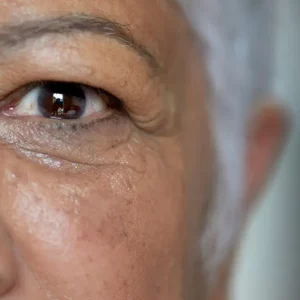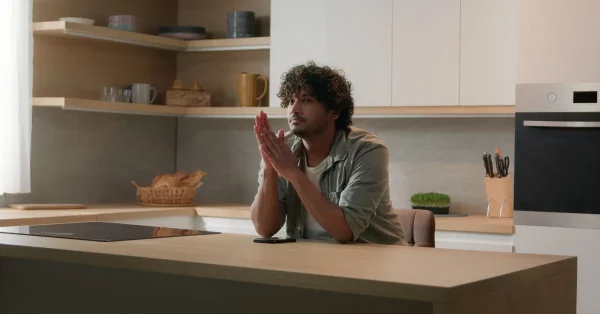Although it is rare, some TBI patients can develop high blood pressure after head injury.
In this article, you will learn some of the causes and effects of high blood pressure, also referred to as hypertension, after a brain injury or concussion. We will explain why controlling your blood pressure can help improve cognitive function.
Parts of the Brain that Regulate Blood Pressure
Blood pressure varies by heart function, salt and water retention, and the diameter of blood vessels. When the heart’s left ventricle contracts, it forces oxygen-rich blood through your arteries to every body part via the network of vessels. These vessels can be more constricted or dilated in response to various physiological factors.
The brain also plays a role in determining blood pressure. Specifically, the brain stem helps regulate cardiac output and adjusts blood vessel diameter.
How the Brain Stem Controls Blood Pressure
The medulla oblongata is the part of the brain stem in charge of cardiac function. The medulla receives information from baroreceptors that monitor arterial blood pressure.
If blood pressure gets too high or too low, these receptors send signals to the medulla. The medulla, in turn, causes the arteries to dilate or constrict, depending on what the body needs.
When the arteries dilate, this lowers the overall pressure that the heart has to overcome to successfully pump the blood through the vessels. Thus, the brain can lower the body’s blood pressure by dilating the arteries.
In addition, the brain stem also receives signals from higher brain regions, such as the limbic system. In stressful conditions, these areas signal the medulla to constrict the arteries and raise blood pressure.
Causes of High Blood Pressure After Head Injury
Now that you understand how the brain controls blood pressure, we can discuss some of the causes of high blood pressure after head injury.
There are two main causes of high blood pressure after a TBI:
- The medulla can no longer detect signals from the baroreceptors telling it to dilate the arteries.
- Damage to the rest of the brain makes the brain stem think the body is in distress, causing it to raise blood pressure.
Blood pressure might also rise because the body releases an excess of catecholamines into the bloodstream after a brain injury. Catecholamines are stress hormones that cause the heart to pump harder and faster to send more blood to major organs, including the brain.
If high blood pressure lasts for too long, it can cause serious problems, which we’ll look at next.
Symptoms of High Blood Pressure

Most high blood pressure is asymptomatic (without symptoms), which is why it is sometimes called the “silent killer.” Because of this, it is generally advised to check blood pressure regularly even if you don’t have symptoms. Occasionally, blood pressure can cause overt symptoms, which could include:
- Fatigue
- Confusion
- Increased irritability
- Severe headache
- Difficulty breathing
- Chest pain
However, the most common effects of long-term high blood pressure are its effect on heart health, increased risk of stroke, and various organ health. There is also evidence that hypertension can negatively impact cognitive function. Research shows that patients with high blood pressure perform more poorly on tests that measure memory, attention, and executive function.
This may occur because high blood pressure diminishes cerebral blood flow and metabolism. If your brain cannot get enough oxygen from the blood, it won’t function as efficiently.
Finally, prolonged elevated blood pressure is also associated with cognitive decline and vascular dementia, and increases your risk of suffering a stroke. All of this shows why it is crucial to get your blood pressure under control after a head injury.
Treating High Blood Pressure After Head Injury
While medication is often effective at lowering blood pressure, it is generally prescribed after other methods have failed. Some of the side effects of blood pressure pills can be dangerous.
Fortunately, several lifestyle changes can help you lower your blood pressure after a head injury.
1. Increase Activity

With increased activity, your body adapts by relaxing the smooth muscles in your arteries leading to vasodilation. In addition, exercise strengthens the heart, which means it can pump with less effort. This puts less strain on your arteries and will lower your blood pressure.
The American Heart Association recommends that people practice moderate physical activity for at least 40 minutes, three to four times per week.
These 40 minutes don’t have to all be in one session, and they don’t have to be as intense as running a marathon. Some examples of activities you can do include:
- Walks around your neighborhood
- Taking the stairs
- Short bike rides
- Gardening
Again, nothing too strenuous, but enough to elevate your heart rate.
You may be wondering if exercise is safe after a head injury. Although doctors used to advise their patients to avoid all strenuous activity for weeks after a TBI, the science no longer supports that idea.
In fact, moderate exercise can actually improve cognitive recovery in patients with head injuries.
Of course, you should not overdo it. If exercising causes you excessive fatigue or headaches, back off your intensity. Try slowly building up your tolerance by starting with five-minute sessions (or less!) and working your way from there.
The more active you stay, the healthier you will be, which will help both your cognitive function and blood pressure.
2. Change Your Diet

Changing your diet will help you lower your high blood pressure after head injury. Specifically, you will want to increase potassium intake and cut down on sodium.
Potassium helps lessen the effect of salt in your body and eases tension in the blood vessels, both of which will reduce your blood pressure. Some foods that are naturally high in potassium include:
- Bananas
- Avocados
- Sweet potatoes
- Tomatoes
- Fish
- Reduced-fat milk and yogurt
Many of the foods that heal the brain after a concussion are also low in sodium and high in potassium. So try to add those to your diet as well.
3. Practice Mindfulness

Mindfulness and meditation techniques are both effective methods for lowering blood pressure after head injury.
Mindfulness simply means staying mentally present to your surroundings and the current moment. This helps you ignore the constant chatter that our brains normally produce, which is often the source of our stress and anxiety.
To stay mentally present, it helps to have a point of focus that pulls your attention to your body. For most people, this point of focus is their breath.
When your mind focuses on your breath, it’s much harder for thoughts and worries to get in. It gives you a chance to step back from the constant tailspin of anxiety and observe what you are feeling with a clear mind.
Mindfulness is one of the principles behind yoga, which is an excellent technique for reducing blood pressure.
In fact, studies have found that yoga practices can decrease diastolic blood pressure by 3.6 mmHg, which is comparable to many blood pressure medications.
High Blood Pressure After Head Injury: Key Points
High blood pressure is a rare but serious secondary effect of head injury. If left untreated, it can lead to cognitive decline and increase your risk of stroke as well as a variety of other health concerns.
Treating high blood pressure may also help improve mental clarity after a head injury. Therefore, if no other treatments are helping, get your blood pressure checked. It may be making your cognitive function worse.
Lifestyle changes such as meditation, exercise, and a healthy diet can all help lower blood pressure. If these changes do not work, some medications may need to be prescribed by your doctor.
As always, talk with your doctor before starting any new drugs or making any changes in your diet. They can help you make the best decision for your health.










